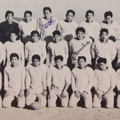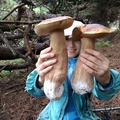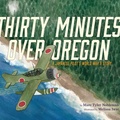It was just before Christmas when I went to Auntie Junko and Uncle Bill’s house on my own for the first time. I got to the bus stop around nine to wait for the 9:15 bus to Downtown. Because it’s L.A., people always assume the buses will be late. It’s when they aren’t that they surprise you, and I didn’t really feel like waiting an hour in the rain for the next one. As I sat on the bench counting my change, I watched BMWs and Mercedes turn out of the Chevron station and head down the hill, probably toward offices downtown. An older Hispanic woman carrying a plastic Ralphs bag full of cleaning supplies came and sat on the next bench. I glanced at her scuffed, white sneakers and back at my wet Vans. I’ve never cared about my appearance even though my mom tells me that it’s important to dress in a way that gives people the impression I’m a good guy.
It had been almost a year since Uncle Bill died and Auntie Junko finally decided she wanted to start giving away his things. I hadn’t seen either of them much since I was a kid but I had happy memories of their house with its koi pond in Altadena. When I was younger, I could spend hours sitting on the concrete bridge, staring down at the orange, black and white fish below. That was a long time ago, though, and now I didn’t know what to expect. Uncle Bill was in his eighties when he died and I doubted I could use any of his stuff. But I didn’t want to hurt Auntie’s feelings and the thought of Uncle Bill’s belongings sitting in a Goodwill store made me kind of sad. Also, I remembered that after their cat, Happy, died a few years ago, Auntie kept her cat bed for months, even though she knew she was too old to adopt a new kitten. I wanted her to know I understood.
Just up the hill, I saw my bus, the 444, stopped at the closest light, and I felt my pocket to make sure the change was still there. I’d just started taking the bus to community college that fall, and I was sometimes afraid that I might accidentally look at someone the wrong way and get myself in trouble. Everyone still worried about me as if I couldn’t do the simples things without screwing up or getting confused. When I called Auntie that morning to tell her I was leaving, she said, “Okay. Kiotsukete, be careful, ne,” in her tiny, hopeful voice. I knew that she would start checking her clock before eleven, wondering whether or not I was okay.
As I stood up, a girl ran down the hill towards us without an umbrella, clutching a leather bag to her side. She reached the bus just as I was feeding my change into the machine, and she seemed so unworried about how much noise she made just breathing that I had a feeling she was probably the kind of person who was never at a loss for words.
“How much do I owe you?” she asked the driver, out of breath and smiling.
The bus driver looked her up and down. Like most L.A. bus drivers, she seemed offended by anyone who didn’t already know their way around. “Where you going?” she said.
“Downtown.” The girl pushed up her sunglasses and fished around her bag. Her hair was dark and curly, drenched and falling everywhere.
“That’s two seventy-five,” said the driver. The girl pulled out her wallet and began digging through it.
I found a spot at the back end of the bus, partly so I wouldn’t have to sit near her. I’m not good at dealing with girls. They either make me nervous, or annoy me, or remind me of my sister which is some combination of the two. Whichever kind this one ended up being, I didn’t want her thrust uninvited into my morning. She sat down across the aisle from me. I put on my headphones and the bus took off.
Outside the windows, the streets were grey and sleepy, and I watched streaks of rain collide and combine on the glass as the city blurred behind it. Remembering where I was going, I tried to dig up some kind of memory of Uncle Bill. I suddenly pictured myself sitting at the table with him as a kid. He would pour ginger ale into a crystal glass for me when he drank beer, clinking his glass against mine and teaching me to say, “Kanpai,” Japanese cheers. I remembered his tweed pants and his—a mix of shaving cream, cedar and wool that seemed to come from old age.
We used to visit him and Auntie regularly when I was growing up, but once I was old enough to think about it, it had become depressing to go to their house and see how old they were and how much closer to death. In high school, I stopped seeing them almost altogether when I moved to Chicago to go to a residential school for people “like me.”
The Chrysalis School. I hadn’t thought about my time there in a while, mostly because I don’t really like to think about it. The school was okay, but any cool people I met I had to say goodbye to, and most of the people there were total weirdos, like Bobby, who used to be my roommate until he tried to kill himself by jumping out a second story window, or Jordan, who I got in a fight with the week after it happened. Everyone had been on edge after we found out about Bobby, and Jordan had been bugging me for a long time. It was like he had it out for me and it’s hard for me to control myself once someone has been annoying me for that long.
“You’re Autistic,” he said, a few days after Bobby jumped.
“You’re a freak,” I said, wanting to end the conversation and go back to my room.
“You’re a half-breed Jap,” he spit, and that’s when I punched him in the face.
* * *
The bus had reached downtown and I was shaken out of my thoughts by the sound of taunting voices. I looked up to make sure nobody was talking to me. Instead, I saw a man leaning over the seat of the girl who had gotten on the bus at my stop. She was facing her window, pretending not to notice that he was there, but she seemed smaller to me than before and I felt bad for her. I looked away but put down my headphones.
“Where you from?” the man was asking. “You from Afghanistan, princess? Come on, you not going to talk to me, where you from? Don’t be scared of me, I’m a nice guy. You’re beautiful, where you from?”
“Torrance,” she said. Something about her voice made me think she was lying.
“No,” he persisted. “Where you really from? Where’s your family from? You telling me with beautiful lashes like yours, your family’s not sand people?” I scanned the front of the bus to see if anyone was looking, but they weren’t. The man’s voice didn’t seem to carry over the noises of the bus.
“I’m Persian,” she said.
“Oh,” he said, tauntingly. “What’s it like to live in Persia?”
She looked back out the window like the conversation was over.
“Come on, answer me,” he said. “You not going to talk to me anymore, Persia?”
I didn’t want to get involved with anything but without realizing it I had stood up and walked toward them. I tapped the girl on the shoulder. “Uh, if you want, there’s an extra seat over there next to mine,” I said. She looked from me to the other guy and picked up her bag.
I sort of expected him to follow us, and I was starting to sweat. I didn’t want to get involved. Now that I was out of high school, I couldn’t handle getting into trouble, and I thought of Auntie watching the replay of last night’s Lakers game, waiting for me. But he didn’t do much. “Fucking spoiled bitch,” he mumbled, and wandered to the front of the bus.
The girl took the window seat and I sat down next to her. She was beautiful, the kind that makes me really nervous. I wanted to say something to make her feel better, let her know that I understood, but I let myself put my headphones back on.
“Thanks,” she said with a smile. “I didn’t know what to do back there. I don’t ride the bus very often, but my car’s in the shop and I had to meet a friend downtown.”
Words flew from her mouth and I knew that if I tried to say something I wouldn’t be able to keep up. Without meeting her eyes I nodded and said, “Uh, it’s not really a big deal.”
She seemed to take the hint and we spent the rest of the bus ride in silence. I closed my eyes to make sure she wouldn’t try to say anything else. My Alice in Chains album ended and I was too nervous to find something new. We pulled into Union Station, the hydraulic doors opened and everyone gathered their things to leave. The crazy guy had gotten off already. I looked at the girl out of the corner of my eye and wondered how to get away and say something nice, but with as few words as possible.
I searched my mind. “Bye,” I said. Without looking at her, I hurried down the aisle and out the doors, sweating and hating myself.
* * *
I was almost to the station entrance when she caught up with me with one small, tan hand on my arm. “Hey, thanks again,” she said. Her smile was soft and kind, like probably what my mom means when she says to look at people like you’re a nice person. “I’m Serena. What’s your name?”
“Max,” I said, squinting in the diffused sunlight. I guess the rain had stopped.
“It was really nice of you to help me out back there,” she said.
I wanted to know how she felt about what had happened, if she was used to it or if she didn’t really care, or if it was something that would come back and bother her later in the day. Maybe this might be the kind of time where a normal person asks a stranger if they want to go to Starbucks, I thought. “It’s really no big deal,” I said instead.
“You’re from Palos Verdes, right?” she asked. “I mean, I remember seeing you get on the bus as I was running to catch it.”
“Yeah.”
“Oh cool,” she said. “My parents just moved there from the Westside this fall, so this will be my first Christmas there. You like it?”
My heartbeat raced, but I thought about the question seriously. “It’s okay,” I said, looking down at my shoes. “But the people are generally pretty uptight.”
She laughed a little, her eyes narrowed in curiosity. “Yeah, I’ve sort of been getting that,” she said. “But you can’t complain about the view, right?”
I shrugged, afraid to say anything else now that she seemed to think I was okay. “Yeah,” I said. After years in Chicago, I had come to love the ocean, its sharp smell, the way it moved. Some days I would drive down to the beach with my brother and his friends. As they surfed, I would sit under the cliffs and watch the sandpipers race across the shoreline. “It’s okay.”
She smiled, her head cocked. As much as I wished I could talk to her about what happened, the stress was too overwhelming and suddenly I could only think of the train I had to catch. It left every fifteen minutes, I thought, but I couldn’t be sure anymore. My hands fidgeted in my pockets.
“I’m sorry,” I said. “I have to go.”
She continued to look at me with the same thoughtful expression. I don’t know what she saw, but she said, “Okay.” She hesitated. “Let me give you my number before you go. Maybe you could tell me what there is to do in Palos Verdes.” She scribbled something on a scrap of paper and put it in my sweaty palm. “Bye, Max,” she said. “Take it easy.”
“Bye… Serena.”
© 2010 Mia Nakaji Monnier





